wee Cal was watching the horror movie The Mist based on Stephen King, in which the end was famously altered for movie purposes, which as I have noted here before, serve a different master from narrative logic, and I had wandered into the kitchen to make tea, having lost interest in the story. The characters,-----spoiler warning----lost interest in their own story only shortly after and cal called me back to watch. Now, did they decide to commit communal suicide because all hope was gone? Had they suffered an accelerated loss of weight; had their hair grown into a tangled mess and their fingernails gone unkempt and they nobly wished to stave off the probability of being tempted to eat each other somewhere in the vast American desert ? No, they opted for suicide shortly after running out of gasoline, somewhere in new England.
It's a classic example of Oscar Wilde's description of sentimentality as the desire 'to have an emotion without paying for it.'
But I found myself dwelling on this other notion, that in life we are conscious, to a greater or lesser degree, of playing out a story. For example, somewhere in the vast expanse (1066 pages... I have no hope of locating it) of Martin Gilberts' Churchill; a life there is, as I remember it, in a quotation from a letter or somebody's reminiscence, a moment in which Churchill, after a personal health crisis during World War ll, says to the wife of his bosom that it would be sad to miss the end of the story. Having personally invested so much of himself in the war effort he wanted to know its outcome and not be taken untimely from this mortal plane, but he expressed it in the terms of following a 'story.'
In his interview in The Comics Journal sometime before his death in '96, Burne Hogarth retold this parable, for which we should picture a medieval setting: A man walks across a field and sees two other men "... lifting heavy stones and putting them in wheelbarrows. And he comes to the first and he says, "What are you doing, my good man, doing this heavy labour?" The man stands up and says, "Well at home I have seven children and a wife, all these mouths to feed; and if I don't labor this way from dawn to dark, what will they eat? They'll starve." And so the questioner goes to the next man and says, "What are you doing here, lifting these heavy stones?" And the man wipes his brow and stands up, and he points to the far distance, and on the horizon line you see this place where stones are being laid out and it looks like the beginnings of a building. And a lot of work is going on with some of the laborers putting stones in place from the wheelbarrows, "You see far out there? I am building Chartres Cathedral."
We take part in a greater or lesser story according to our imagination, and our mind's ability to rise above the daily transactions of survival.
Did David Foster Wallace feel his own story could advance no further when he committed suicide? Douglas Valentine at Counterpunch, apparently a writer of smaller imagination, fallaciously assumed that of the two pieces of information to come his way with regard to the dead author, that he had branded irony as 'not liberating but enfeebling' and that he had committed suicide, one could explain the other. And he concluded by rather absurdly suggesting: "You should have done what we did, David: laughed and gotten drunk."
Dan Clowes in a recent interview: " You say things that just occur to you on the spur of the moment and then 10 minutes after the interview, you think, "I guess I don't really believe that.""
On a panel in San Diego recently I said that I don't keep sketch-books and all the drawing I do is for publication. Naturally this was quoted online the next day, whereupon I thought to myself, but that's not exactly true. Every day I feel a compulsion exercise my story telling muscles, to cobble together assorted links and quotes, to look for connections and try to sketch them into a little narrative, a sketch of a story, like I have just been doing with the last 700 words.
Labels: thoughts
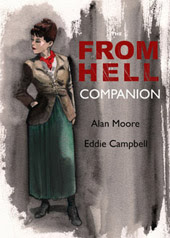
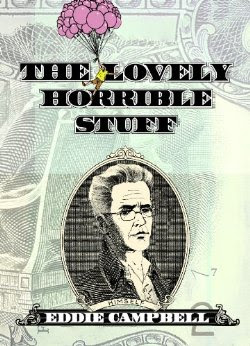

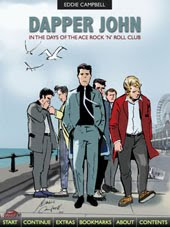
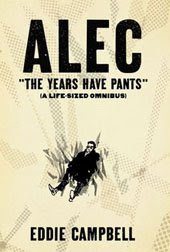
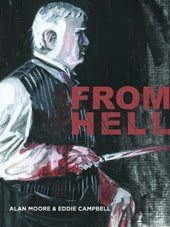
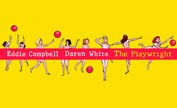
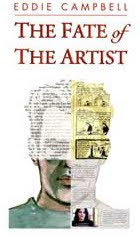
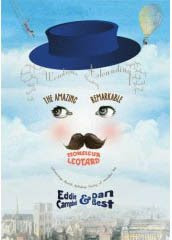

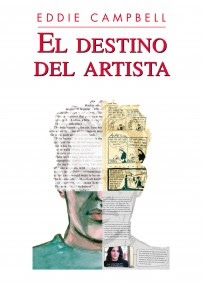
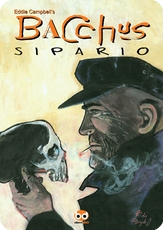
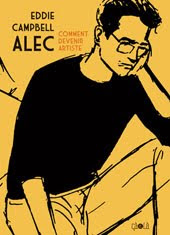

3 Comments:
Your friend Mia will know (because I've seen her comment there...) that M John Harrison's old blog featured some extended critiques of stories. He finds the process fraudulent and debased because politicians and marketing people also "tell stories". I don't think I saw him explain how he still manages to write novels but it's his argument, not mine, and I should probably stop paraphrasing.
Scientific American ran a feature recently on the attraction of storytelling. I usually see the attraction as being that of other artistic processes: stories apply a structure to the mess of reality and some structures are more attractive than others.
The creatures in The Mist, btw, were designed by Bernie Wrightson.
Oh everyone knows that David Foster Wallace committed suicide for personal gain. Just ask John Ziegler.
John- thanks for the link
eric, likewise-- how spiteful of the guy. Since 'genius' is hardly measurable- if you can't see it it's either because it's not there or it's not visible to you- thus beyond worthwhile argument. the only advantage of supposed genius is the occasional grant of money, which i guess some people think makes it worth arguing about.
Post a Comment
Subscribe to Post Comments [Atom]
<< Home